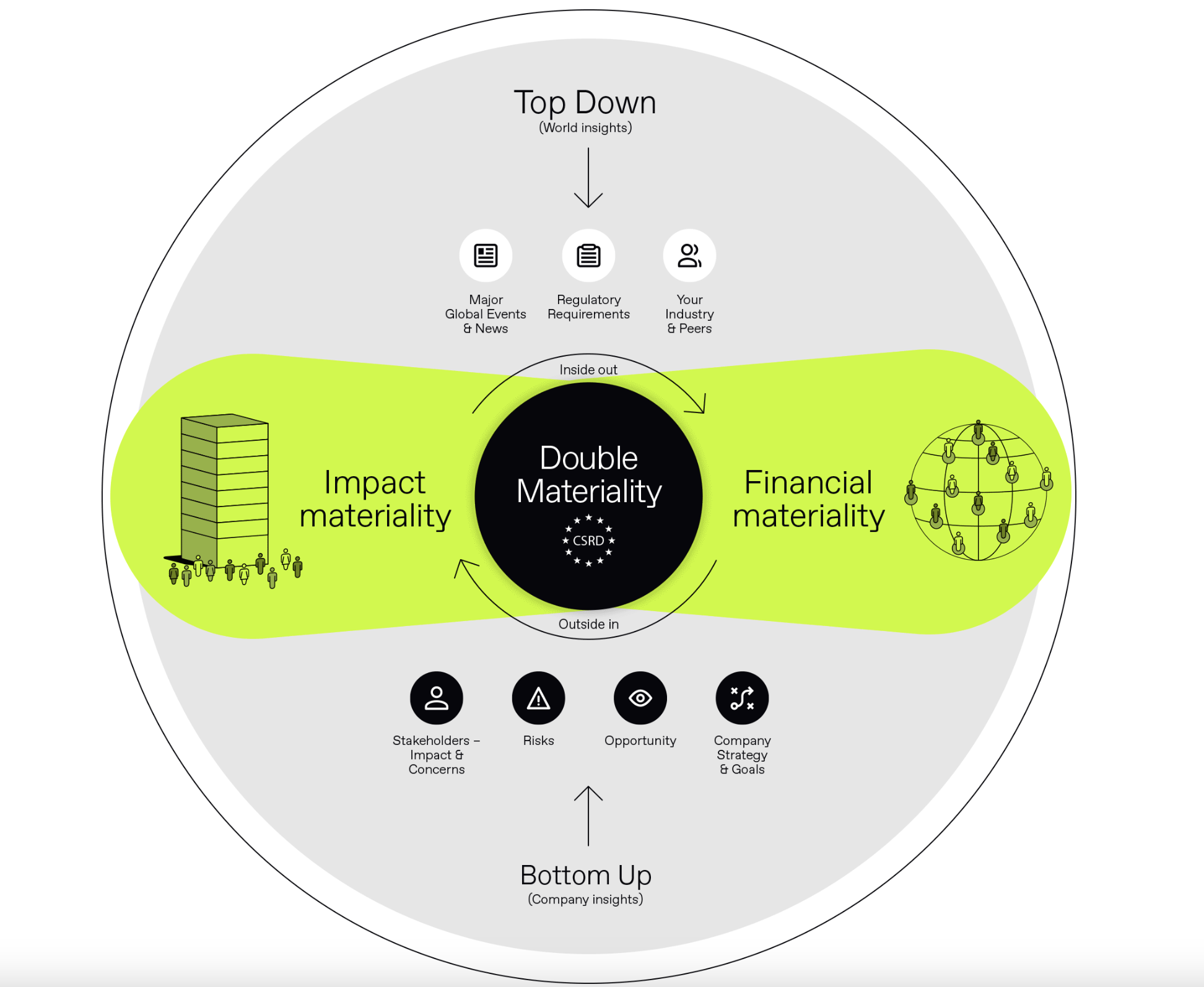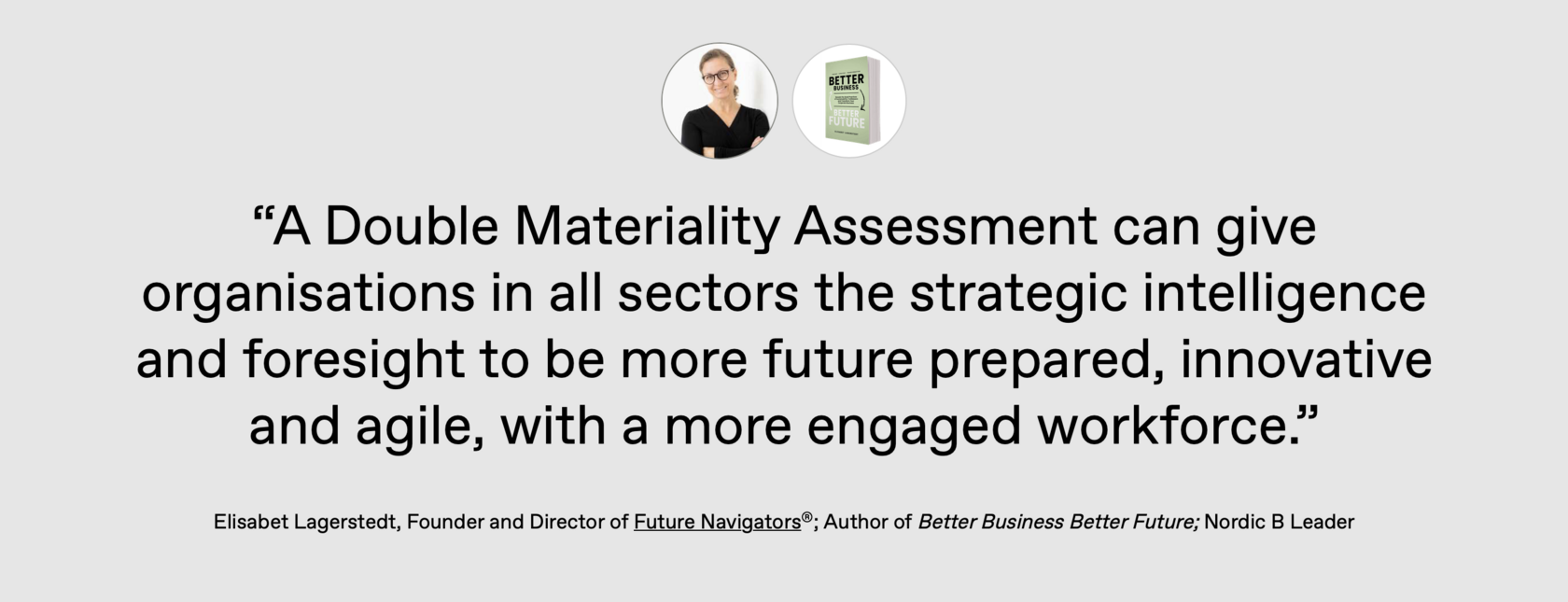How Double Materiality Can Shape a Robust Business Strategy

In today's business landscape, understanding both your company's impact on society and the environment, as well as the financial implications of these impacts, is crucial. This is where a Double Materiality Assessment (DMA) comes into play. Unlike traditional assessments that focus solely on financial or impact materiality, a DMA offers a holistic view by evaluating and ranking all sustainability impacts, financial risks, and opportunities associated with ESG (Environmental, Social, Governance) issues.
A DMA not only aligns these elements with the priorities and views of your stakeholders but also helps in developing a comprehensive strategy that integrates seamlessly into your core operations and business strategy. By considering both the risks your company faces and the risks it poses to the environment and society, a DMA provides a complete picture of ESG risks and opportunities.
This approach is recommended over standalone Financial Materiality Assessments or Impact Materiality Assessments. It builds greater stakeholder trust, aids in regulatory compliance, and enhances strategic planning, risk management, and overall execution. By adopting a Double Materiality Assessment, your company can ensure not only financial success but also responsible stewardship of the environment and society, setting the stage for sustainable growth.
By embedding double materiality into your business strategy, you ensure responsible stewardship of the environment and society as well as sustainable profitability. This holistic approach is essential for building Better Business and a better future.
Robust input to your business strategy
Here’s how a DMA can help you create robust input to your business strategy:
1. Identifying key impact areas
2. Engaging stakeholders
3. Enhancing risk management
4. Spotting opportunities
5. Strategy development
6. Measuring performance
7. Gaining competitive advantage
8. Ensuring regulatory compliance
9. Driving innovation and efficiency
Let's dive into each of the points above one by one.
1. Identifying Key Impact Areas
A DMA identifies critical environmental, social, and governance (ESG) issues that are material to your business. By pinpointing these areas, you can focus on where your company can make the most significant positive impact while also recognizing potential risks and opportunities that affect long-term sustainability and profitability.
2. Engaging Stakeholders
Involving stakeholders such as customers, employees, investors, regulators, and communities in the DMA process offers invaluable insights into their expectations and concerns. This engagement builds trust and ensures your business strategy aligns with stakeholder expectations, addressing their most pressing issues.
3. Enhancing Risk Management
A DMA provides a thorough understanding of risks from both financial and non-financial perspectives. This enables your company to identify and mitigate risks related to climate change, resource scarcity, regulatory changes, and social issues, thus enhancing overall resilience.
4. Spotting Opportunities
Evaluating environmental and social impacts alongside financial performance helps in discovering new business opportunities. This might include developing sustainable products and services, exploring new markets, or tapping into customer segments that prioritize sustainability.
5. Strategy Development
Insights from a DMA can be seamlessly integrated into strategy development and planning. This involves setting clear sustainability goals and developing initiatives that address material issues, such as reducing carbon emissions, improving labor practices, or enhancing community relations.
6. Measuring Performance
DMA establishes a baseline for monitoring and measuring performance on material issues. Regular assessment and reporting of progress toward sustainability goals ensure continuous improvement and strategy refinement based on performance data and feedback.
7. Gaining Competitive Advantage
Effectively integrating double materiality into your business strategy can differentiate your company. It builds a reputation as a responsible and sustainable business, attracting and retaining customers, employees, and investors who value sustainability.
8. Ensuring Regulatory Compliance
A DMA ensures your company is prepared to comply with current and future requirements, avoiding legal and reputational risks.
9. Driving Innovation and Efficiency
Addressing environmental and social issues fosters innovation and operational efficiency. This could mean developing new technologies and business models that reduce environmental impact or improving resource efficiency, thus reducing costs through sustainable practices.
A great tool to accelerate your process
A great tool to accelerate your process is Ansarada's Double Materiality Assessment, with which you can get started for free. They automatically shortlist the right ESG issues for your business and more to make the whole process more systematic and intuitive.


